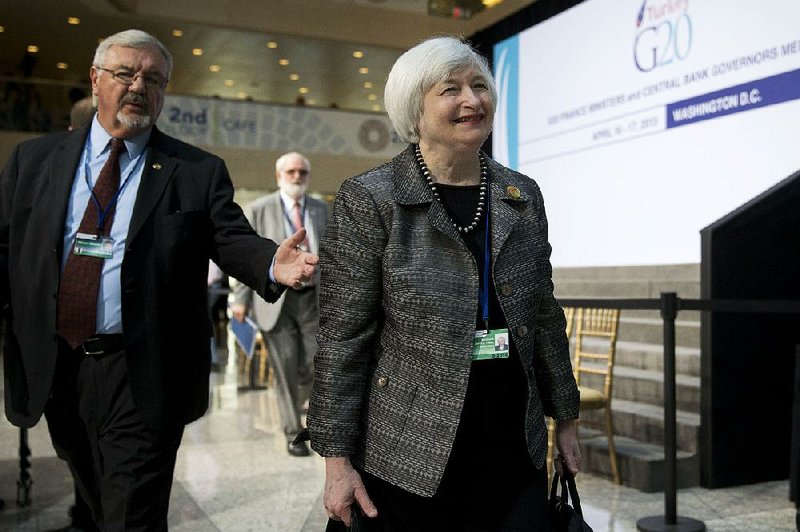WASHINGTON -- Financial officials from the world's major economies are welcoming modest improvements in the global economy while sidestepping fears rattling global financial markets that Greece will default on its bailout loans.
Officials from the Group of 20 issued a joint release that pledges greater efforts to improve confidence and reduce economic vulnerabilities. The meetings' chairman, Turkey's Deputy Prime Minister Ali Babacan, said the problems confronting Greece did not come up during two days of discussions.
Babacan told reporters at a closing news conference that officials did discuss risks to market stability that could come when the Federal Reserve begins to raise interest rates. Babacan has said there was a view that the Fed is doing a better job of providing guidance about its future moves.
The discussions were being held among finance ministers and central bank presidents of the G-20, composed of traditional economic powers such as the United States, Japan and Germany and emerging countries such as China, India and Brazil.
Treasury Secretary Jacob Lew and Federal Reserve Chairman Janet Yellen were representing the United States at the meetings, which began with a dinner Thursday night and concluded with a news conference Friday afternoon.
The G-20 talks were in advance of the spring meetings of the 188-nation International Monetary Fund and its sister lending organization, the World Bank.
On Friday, World Bank President Jim Yong Kim announced that the World Bank would give Guinea, Liberia and Sierra Leone an additional $650 million to help the three West African countries recover from the economic effect of the Ebola crisis.
The announcement came at an Ebola conference attended by the presidents of the three nations and U.N. Secretary-General Ban Ki-moon, who said that the full recovery from the Ebola crisis would occur only "when the outbreak has ended and safeguards have been put in place to prevent reintroduction of the disease."
The finance meetings were taking place at a time when much of the global economy remains stuck in a prolonged period of sluggish growth after the 2008 financial crisis and a recession that was the worst in seven decades.
IMF Managing Director Christine Lagarde told reporters Thursday: "The good news is that the global recovery continues. The not-so-good news is that growth remains moderate and uneven."
She said the goal of the talks was to produce a revamped action plan that will "prevent this new mediocre from becoming the new reality."
The IMF's latest economic forecast predicted modest overall growth and downgraded the prospects of some nations including the United States, forecasting U.S. growth of 3.1 percent this year, a half-point lower than its January estimate. The reason: IMF economists believe the sharp rise in the value of the dollar will hurt American companies trying to export goods overseas.
Growth prospects in oil-exporting nations are being hurt by the big drop in oil prices over the past year, but those declines are expected to improve prospects in many oil-importing countries.
The IMF this week also raised new concerns that severe volatility in financial markets could be triggered if the Federal Reserve moves, as is widely expected, to start raising interest rates later this year. If the Fed's rate increases after a prolonged period of ultralow rates cause investors to rush for the exits, it could cause stock prices to tumble and interest rates to rise sharply.
Previewing the G-20 discussions, Babacan told reporters Thursday that the G-20 countries needed to do more to carry out commitments they made last year to jump-start growth by investing in infrastructure projects and removing barriers to trade.
"Growth is there, but it is weak ... and uneven," he said.
The finance ministers will produce an action plan that will be discussed by President Barack Obama and other G-20 leaders at a scheduled summit meeting in Turkey in November. The finance officials are trying to achieve the goal of boosting global economic output by more than $2 trillion over the next five years.
In addition to discussions on global growth, the finance officials will be seeking to keep an IMF-supported bailout for Greece on track. Worries that Greece may be unable to meet forthcoming debt payments roiled markets this week. Greece is scheduled to make two payments of about $1.06 billion to the IMF next month.
Information for this article was contributed by Harry Dunphy, Christopher S. Rugaber, Derek Gatopoulos and Pan Pylas of The Associated Press.
Business on 04/18/2015

